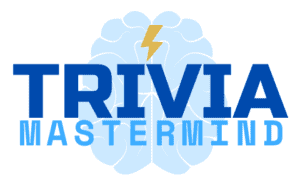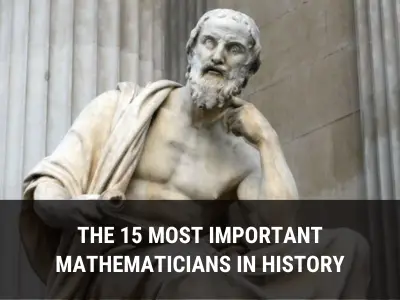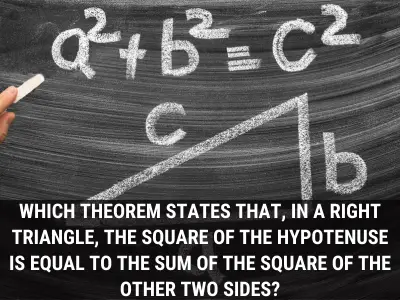The annals of history are adorned with the indomitable spirit of explorers who braved the unknown, charted new frontiers, and expanded the boundaries of human knowledge. From the age of sail to the space age, these intrepid individuals have played a pivotal role in shaping the world as we know it. Their journeys, fueled by an insatiable curiosity and an unyielding determination, have unlocked the secrets of distant lands, unravelled the mysteries of the cosmos, and altered the course of history. In this exploration of the 15 greatest adventurers in the annals of history, we embark on a voyage through time, celebrating the remarkable achievements and contributions of these fearless individuals who dared to venture beyond the horizon.
The List of the 15 Greatest Explorers History
1. Roald Amundsen
(1872-1928)
Roald Amundsen (1872-1928), a skilled and experienced Norwegian polar explorer, is best known for reaching the South Pole first (1911) and the North Pole by air (1926). He was also the first to successfully navigate the Northwest Passage (1903-1906).
Amundsen meticulously planned and organized his expeditions, carefully studying the polar regions and developing new travel techniques in extreme conditions. A natural leader, he inspired his crews to achieve great things.
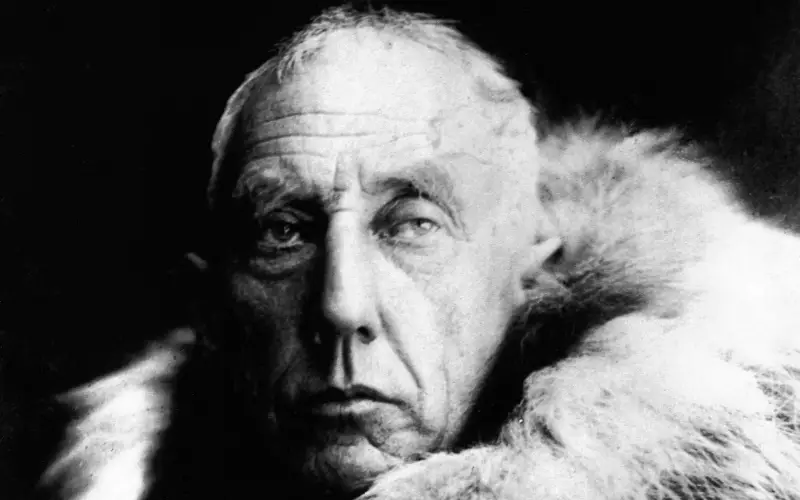
Amundsen’s accomplishments include:
- First to reach the South Pole (1911)
- First to reach the North Pole by air (1926)
- First to successfully navigate the Northwest Passage (1903-1906)
- First to sail through the Northeast Passage around Siberia
- First to cross the Arctic by air
Amundsen, a true pioneer of polar exploration, pushed the boundaries of human knowledge and understanding of the polar regions. His accomplishments, a testament to his courage, determination, and skill, continue to inspire explorers and adventurers today.
2. James Cook
(1728-1779)
James Cook (1728-1779), a renowned British naval captain, navigator, and explorer, made three voyages to the Pacific Ocean. He is best known for charting the east coast of Australia, discovering and mapping New Zealand, and disproving the existence of the fabled southern continent Terra Australis.
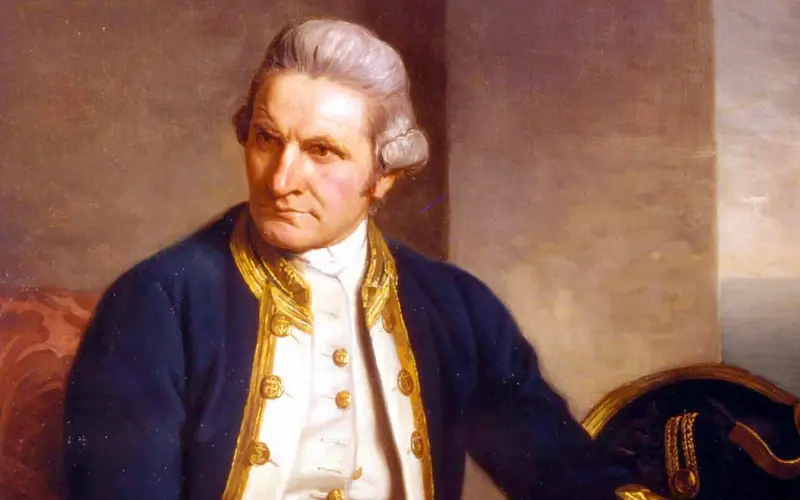
Cook’s accomplishments include:
- Creating the first accurate map of New Zealand’s entire coastline
- Charting a significant portion of Australia’s east coast, including the Great Barrier Reef
- Disproving the existence of Terra Australis, a mythical southern continent
- Conducting extensive observations of the 1769 transit of Venus, which helped determine the distance between the Earth and the Sun
- Collecting a vast amount of scientific data on the Pacific region’s plants, animals, and people
Cook’s voyages were significant for several reasons. They expanded European knowledge of the Pacific Ocean and its islands, paving the way for future exploration and colonization. His meticulous documentation and accurate mapping made his voyages invaluable to scientists and cartographers.
Tragically, Cook was killed in a skirmish with islanders in Hawaii in 1779. However, his legacy lives on. He is considered one of the greatest explorers of all time, and his voyages continue to inspire and amaze people around the world.
In addition to his accomplishments as an explorer, Cook was also a skilled navigator and cartographer. He developed new methods for determining latitude and longitude, producing highly accurate maps of the regions he explored. His navigational and cartographic skills were essential to the success of his voyages and helped lay the foundation for modern navigation and cartography.
3. Sir Walter Raleigh
(1552-1618)
Sir Walter Raleigh (1552-1618) was an English explorer, colonizer, author, and poet. He is best known for his attempts to establish the Roanoke Colony in North America, as well as for his role in introducing tobacco and potatoes to England. Raleigh was also a key figure in the Elizabethan Golden Age, serving as a favorite of Queen Elizabeth I.
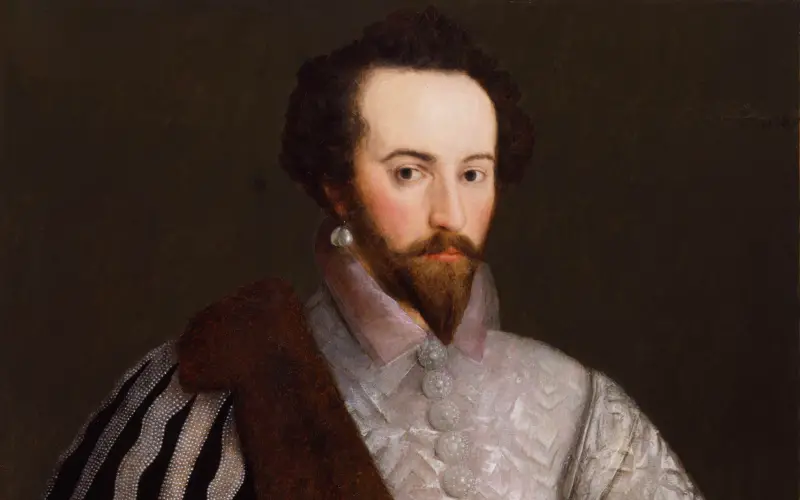
Raleigh’s accomplishments include:
- Founding the Roanoke Colony, the first permanent English settlement in North America (although the colony eventually failed)
- Introducing tobacco and potatoes to England, which became two of the country’s most important crops
- Playing a leading role in the defeat of the Spanish Armada in 1588
- Writing several important works of history and poetry, including The History of the World and The Discovery of the Large, Rich, and Beautiful Empire of Guiana
Raleigh was a complex and contradictory figure. He was a brilliant and ambitious man, but he could also be reckless and arrogant. He fell out of favor with Queen Elizabeth I and her successor, King James I, and was eventually executed in 1618.
Despite his flaws, Raleigh is remembered as one of the most important figures in Elizabethan England. He was a pioneer of English exploration and colonization, and he played a significant role in shaping the course of English history.
Read More Fun Facts
Learn more fun facts with Trivia Mastermind content.
4. Sir Francis Drake
(c.1540-1596)
Sir Francis Drake (c.1540-1596), an English privateer, navigator, and politician, is best known for circumnavigating the globe (1577-1580), the first successful English expedition to do so. He played a critical role in defeating the Spanish Armada in 1588, protecting England from invasion.
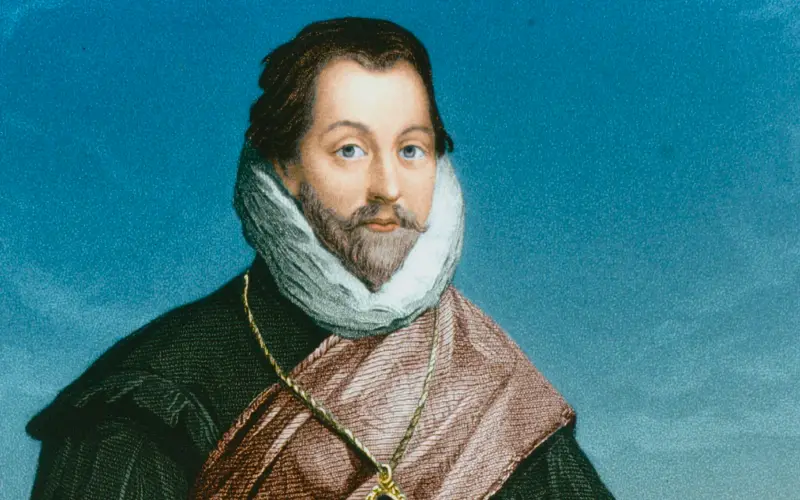
Other notable achievements of Drake include:
- Raiding Spanish colonies and ships in the Americas, including the successful capture of treasure from Nombre de Dios in Panama
- Discovering the Drake Passage, a sea route connecting the Atlantic and Pacific Oceans
- Claiming the west coast of North America for England, naming it “New Albion”
- Serving as Mayor of Plymouth, England
- Being knighted by Queen Elizabeth I
A controversial figure in his time, Drake is now widely regarded as one of the greatest English explorers and naval commanders of all time. He played a major role in shaping the course of English history and helped lay the foundation for England’s rise as a global power.
5. Hernán Cortés
(1485-1547)
Hernán Cortés (1485-1547), a Spanish conquistador, led an expedition that toppled the Aztec Empire in the early 16th century, bringing much of present-day Mexico under the rule of the King of Castile. Cortés was among the first wave of Spanish explorers and conquistadors who initiated the colonization of the Americas.
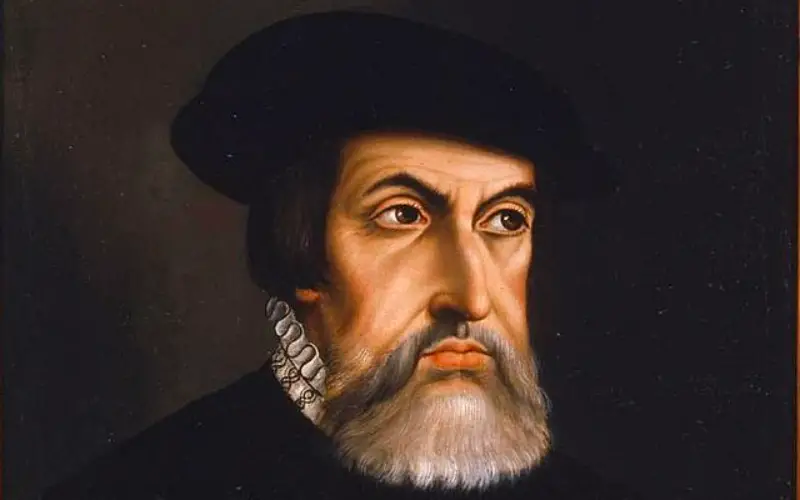
Cortés’s notable achievements include:
- Conquering the Aztec Empire, a Mesoamerican superpower
- Establishing New Spain, the largest and most influential Spanish colony in the Americas
- Introducing Christianity to Mexico and neighboring regions
- Expanding European knowledge of the Americas and its people
Cortés’s conquest of the Aztec Empire was a watershed moment in Mexican and American history. It paved the way for Spanish colonization and the introduction of European culture and religion. While Cortés’s accomplishments were significant, they came at a heavy price. The conquest was brutal and bloody, resulting in the deaths of millions of indigenous people.
Cortés was a complex and controversial figure. He was a brilliant military strategist and a skilled negotiator, but he was also ambitious and ruthless. His legacy remains debated today, yet there is no denying his significance in American history.
Beyond his role as a conquistador, Cortés was also a skilled administrator and diplomat. He established a government in New Spain and negotiated treaties with indigenous peoples. He also played a part in fostering economic development in New Spain, introducing new crops and livestock, and establishing trade routes with other Spanish colonies.
6. Ferdinand Magellan
(1480-1521)
Ferdinand Magellan (1480-1521), a Portuguese explorer, led the first successful circumnavigation of the globe—he was also the first European to cross the Pacific Ocean.
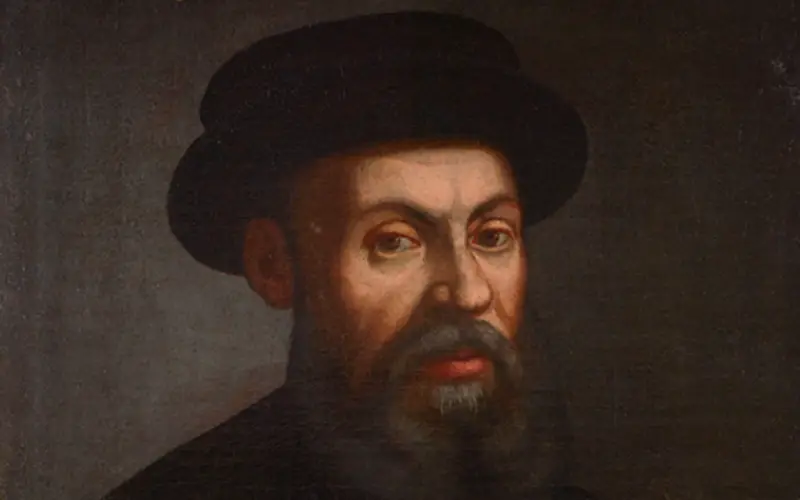
Magellan’s accomplishments include:
- Leading the first successful circumnavigation of the globe
- Discovering the Strait of Magellan, a navigable passage connecting the Atlantic and Pacific Oceans
- Mapping the Pacific Ocean
- Naming the Pacific Ocean (from the Portuguese word “pacífico” meaning “peaceful”)
- Introducing the Philippines to the Western world
Magellan’s voyage was a significant milestone in human exploration, proving that it was possible to sail around the entire globe and expanding European knowledge of the world. His accomplishments also had a major impact on the global economy, opening up new trade routes between Europe and Asia.
Magellan was killed in a battle in the Philippines in 1521, but his expedition continued and returned to Spain in 1522. The circumnavigation of the globe was a major achievement, ushering in a new era of exploration and discovery.
Magellan’s legacy endures today. Remembered as one of the greatest explorers of all time, his accomplishments continue to inspire and amaze people around the world.
Play Trivia!
Challenge yourself and play trivia questions with answers and explanations.
7. Juan Sebastián Elcano
(c. 1476-1526)
Juan Sebastián Elcano (c. 1476-1526), a Basque navigator, completed the first circumnavigation of the globe as captain of the ship Victoria after the death of Ferdinand Magellan.
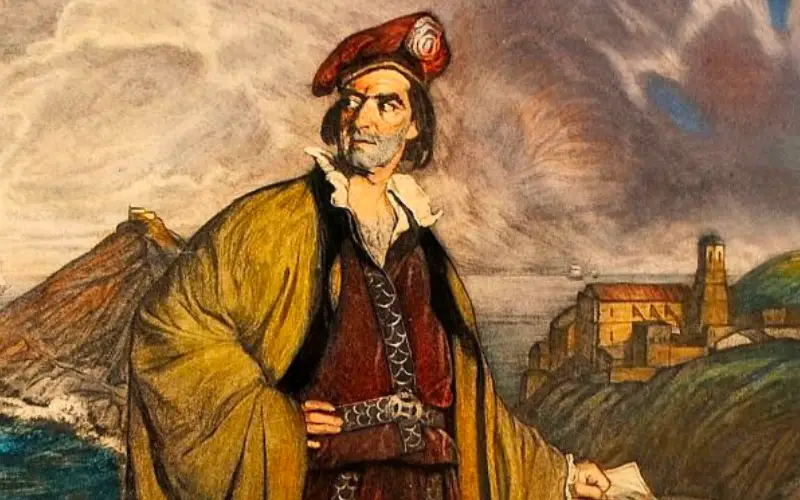
Elcano’s accomplishments include:
- Completing the first circumnavigation of the globe
- Leading the only surviving ship, Victoria, back to Spain
- Proving that it was possible to sail around the entire world
- Expanding European knowledge of the world
- Opening up new trade routes between Europe and Asia
Elcano’s voyage was a significant milestone in human exploration, proving that it was possible to sail around the entire globe and expanding European knowledge of the world. His accomplishments also had a major impact on the global economy, helping to open up new trade routes between Europe and Asia.
Elcano was a skilled navigator, a courageous leader, and a loyal and dedicated member of Magellan’s expedition. His accomplishments are a testament to his skill, courage, and dedication.
Elcano’s legacy is still felt today. He is remembered as one of the greatest explorers of all time, and his accomplishments continue to inspire and amaze people around the world.
8. Amerigo Vespucci
(1454-1512)
Amerigo Vespucci (1454-1512), an Italian explorer, cartographer, and writer, made several voyages to the Americas between 1497 and 1504. He is best known for his letters describing his voyages, which were published in Europe and helped to popularize the idea that the Americas were a new continent, rather than simply another part of Asia.
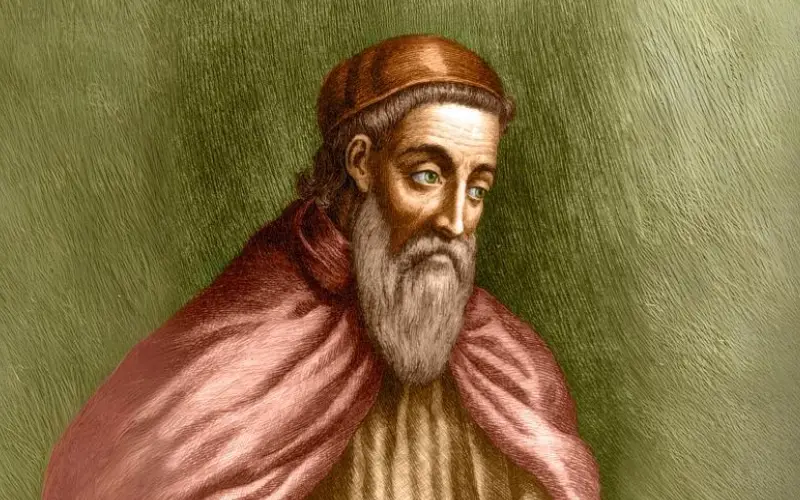
Vespucci’s accomplishments include:
- Vespucci explored the southern Atlantic coast of South America, including the Rio de la Plata and the Patagonian coast. He was the first European to map these regions in detail.
- Vespucci was a skilled cartographer, and he made detailed maps of the Americas. His maps were widely used by European explorers and colonists.
- Vespucci wrote popular letters describing his voyages to the Americas. They helped to shape European understanding of the Americas and to promote interest in exploration and colonization.
- Vespucci was one of the first Europeans to argue that the Americas were a new continent, rather than simply another part of Asia.
Vespucci’s legacy is complex and controversial. He is credited with playing a major role in the discovery and exploration of the Americas. However, some historians have argued that he exaggerated his accomplishments and that his letters were not always accurate. Despite these criticisms, Vespucci remains one of the most important figures in the history of European exploration.
In addition to his accomplishments as an explorer and cartographer, Vespucci was also a skilled writer. His letters are lively and engaging, and they provide a valuable firsthand account of the early exploration of the Americas. Vespucci’s letters are still read today by historians and scholars, and they continue to fascinate readers with their descriptions of new lands and peoples.
9. Vasco da Gama
(c. 1460-1524)
Vasco da Gama (c. 1460-1524), a Portuguese explorer, led the first successful expedition from Europe to India by sailing around the Cape of Good Hope. His voyage opened a new sea route to India and the East, revolutionizing global trade and exploration.
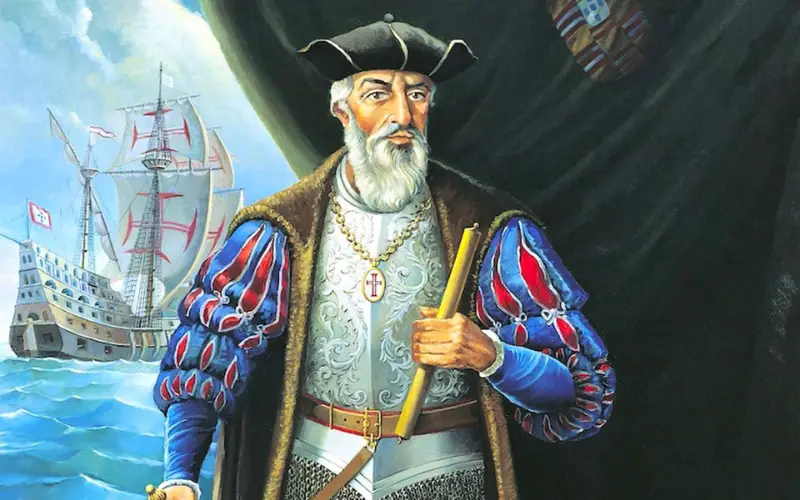
Da Gama’s accomplishments include:
- Da Gama lead the first successful expedition from Europe to India by sailing around the Cape of Good Hope.
- Da Gama’s voyage established a direct trade route between Europe and Asia, which had a major impact on the global economy.
- Da Gama’s voyage expanded European knowledge of the world, by mapping new coastlines and documented the cultures and peoples he encountered.
- Da Gama’s voyage helped to promote Portuguese imperial expansion in the East.
Da Gama’s voyage was a significant milestone in human history. It paved the way for European colonization of the East and helped to usher in a new era of global trade and exploration. Da Gama’s accomplishments continue to inspire and amaze people around the world.
Read More Fun Facts
Learn more fun facts with Trivia Mastermind content.
10. Pedro Álvares Cabral
(c. 1467-1520)
Pedro Álvares Cabral (c. 1467-1520), a Portuguese explorer, is credited with discovering Brazil in 1500. While leading an expedition to India on behalf of the Portuguese crown, he was blown off course and landed on the coast of Brazil. Cabral claimed the land for Portugal and established a trading post. He then continued on to India, where he completed his mission and returned to Portugal in 1501.
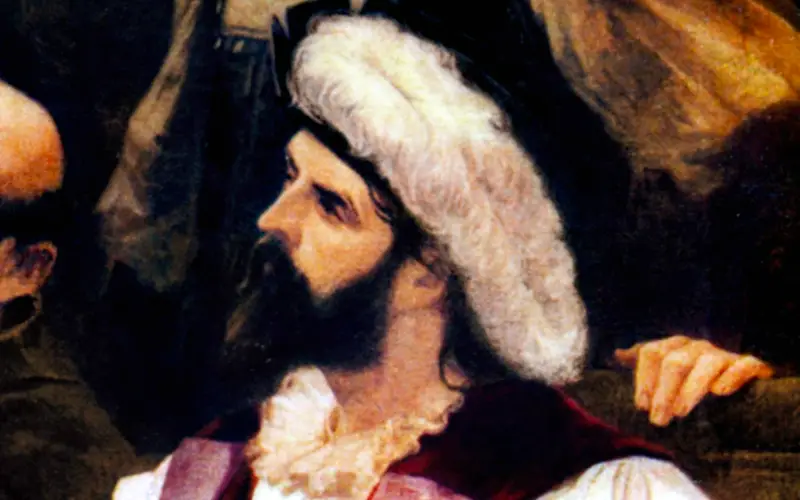
Cabral’s accomplishments include:
- Cabral was the first European to land on the coast of Brazil in 1500. His discovery paved the way for Portuguese colonization of the country.
- Cabral claimed Brazil for Portugal, which helped to expand the Portuguese empire, ruling Brazil for over 300 years.
- Cabral established a trading post in Brazil, which helped to open up new trade routes between Europe and South America.
- Cabral successfully completed his mission to India and returned to Portugal, bringing with him valuable spices and other goods.
Cabral’s discovery of Brazil was a significant event in world history. It marked the beginning of European colonization of South America and had a major impact on the global economy. Cabral’s legacy is still felt today, and he is remembered as one of the greatest explorers of all time.
11. Christopher Columbus
(1451-1506)
Christopher Columbus (1451-1506), an Italian explorer and navigator, led four Spanish-funded voyages across the Atlantic Ocean, establishing the first known European contact with the Caribbean and Central and South America.
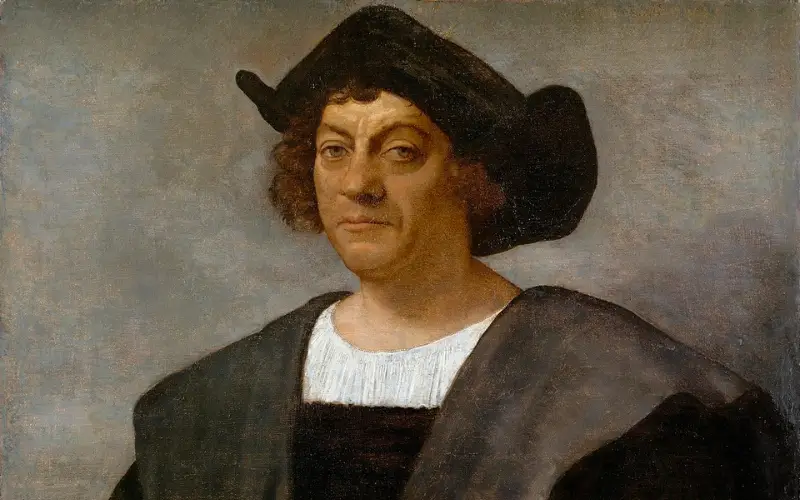
Columbus’s accomplishments include:
- Columbus’s discovered the Americas in 1492, marking the beginning of European colonization of the Americas.
- Columbus’s voyages helped to establish a direct trade route between Europe and the Americas, which had a major impact on the global economy.
- Columbus’s voyages expanded European knowledge of the world, mapping new coastlines and documenting the cultures and peoples he encountered.
- Columbus’s voyages helped to promote Spanish imperial expansion in the Americas.
Columbus’s voyages were significant for a number of reasons. They helped to expand European knowledge of the world, open up new trade routes, and pave the way for the colonization of the Americas by European powers.
Columbus’s legacy is complex and controversial. He is credited with discovering the Americas and ushering in a new era of exploration and trade. However, he has also been criticized for his role in the colonization of the Americas and the exploitation of indigenous peoples.
Despite the controversy, Columbus remains one of the most important figures in the history of European exploration. His voyages changed the world forever, and his legacy continues to be debated and discussed today.
12. John Cabot
(c. 1450-1498)
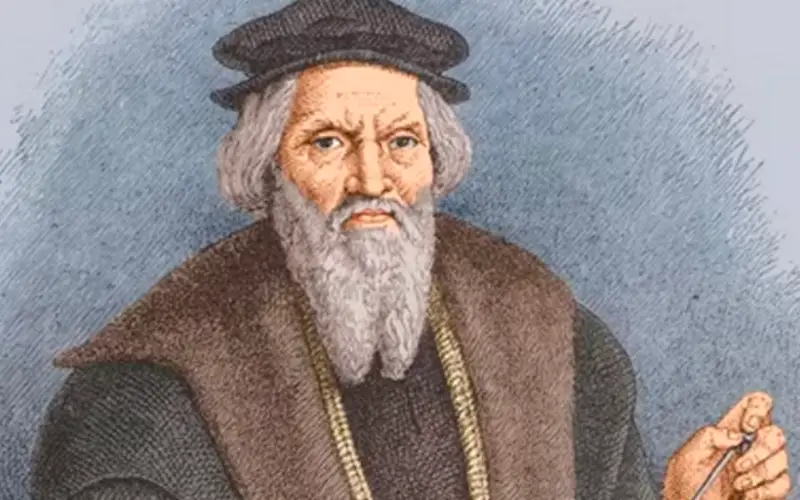
John Cabot (c. 1450-1498), an Italian explorer and navigator, was commissioned by King Henry VII of England to find a new route to Asia. In 1497, Cabot sailed to North America, landing on the coast of what is now Newfoundland, becoming the first European to explore the region since the Norse voyages to Vinland in the 11th century.
Cabot’s accomplishments include:
- Cabot’s exploration of the North American coast in 1497 helped to expand European knowledge of the world and pave the way for further exploration and colonization.
- Cabot’s landing in Newfoundland laid the groundwork for English colonization of North America.
- Cabot’s voyages helped to establish English claims to North America and led to the eventual establishment of British colonies in the region.
Cabot’s voyages were significant for a number of reasons. They helped to expand European knowledge of the world, open up new trade routes, and lead to the colonization of North America by European powers. Cabot’s legacy is one of exploration and discovery, and he is still remembered today as one of the most important figures in the history of European exploration.
Play Trivia!
Challenge yourself and play trivia questions with answers and explanations.
13. Henry the Navigator
(1394-1460)
Prince Henry the Navigator (1394-1460), a Portuguese prince, is best known for sponsoring exploration along the west coast of Africa. He is credited with helping to launch the Age of Discovery and the Atlantic slave trade.
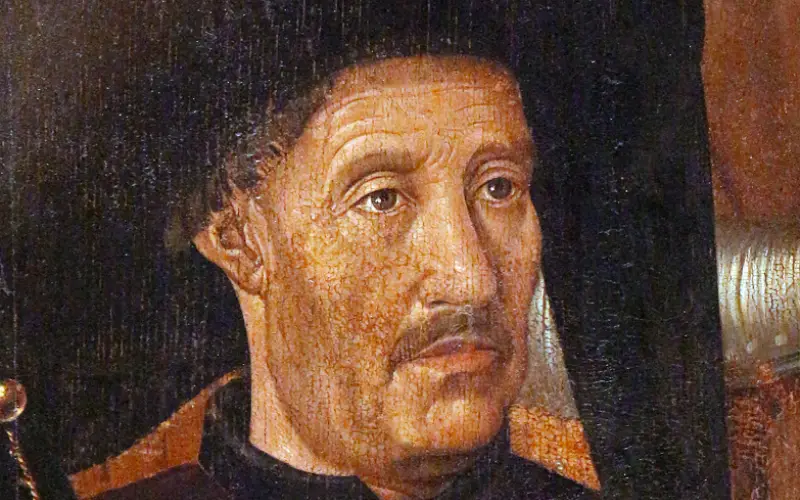
Henry’s accomplishments include:
- Henry’s explorers mapped the African coast as far south as the Gulf of Guinea, opening up new trade routes and expanding European knowledge of the world.
- Henry established a navigational school at Sagres where, navigators and cartographers were trained.
- Henry supported the development of new ships, such as the caravel, which were better suited for long-distance voyages. He also supported the development of new navigational instruments, such as the astrolabe.
Henry’s accomplishments had a profound impact on the world. His support for exploration ushered in the Age of Discovery, which led to the colonization of the Americas and Africa. His investments in navigation and cartography also helped to make Portugal a leading maritime power in the 15th and 16th centuries.
Henry’s legacy is complex and controversial. He is credited with playing a major role in the Age of Discovery, but he has also been criticized for his role in the Atlantic slave trade. Despite the controversy, Henry remains one of the most important figures in the history of Portuguese exploration.
Henry’s accomplishments continue to inspire and amaze people around the world. He is remembered as a visionary leader who helped to expand human knowledge and usher in a new era of exploration and discovery.
14. Zheng He
(c. 1371-1433)
Zheng He (c. 1371-1433), a Chinese admiral and explorer, led seven voyages to Southeast Asia, South Asia, West Asia, and East Africa from 1405 to 1433. He is considered one of the greatest explorers of all time, and his voyages helped to expand Chinese knowledge of the world and promote trade and diplomacy.
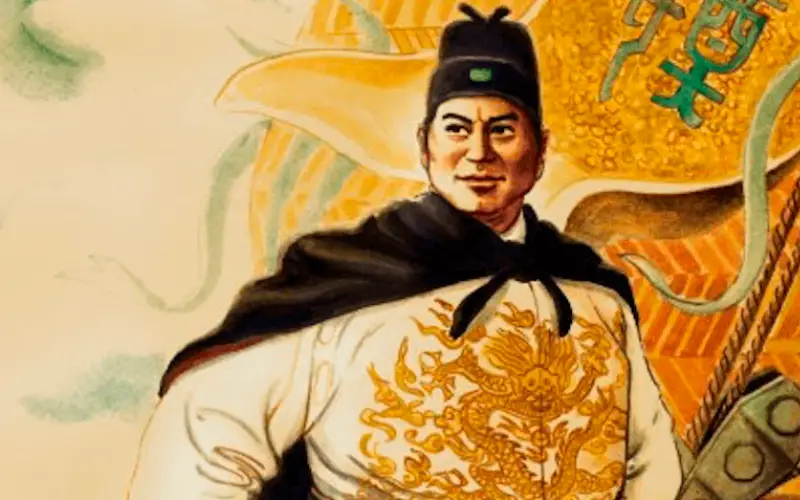
Zheng He’s accomplishments include:
- Zheng He’s lead seven of the largest and most ambitious maritime expeditions of their time, carrying a crew of over 20,000 men.
- Zheng He’s voyages helped to expand Chinese knowledge of the world, having visited over 30 countries and bringing back a wealth of information.
- Zheng He’s voyages helped to promote trade and diplomacy between China and the rest of the world, bringing back a wide variety of goods and establishing diplomatic relations with many countries.
Zheng He’s voyages had a profound impact on the world. They helped to expand Chinese knowledge of the world and promote trade and diplomacy. Zheng He’s voyages also helped to make China a leading maritime power in the 15th century.
Zheng He’s legacy continues to inspire and amaze people around the world. He is remembered as a visionary leader and a great explorer. His voyages helped to shape the course of world history.
15. Marco Polo
(1254-1324)
Marco Polo (1254-1324), a Venetian merchant and explorer, traveled to Asia and China in the 13th century. He is best known for his book, The Travels of Marco Polo, which describes his experiences in Asia and helped to introduce Europe to the East.
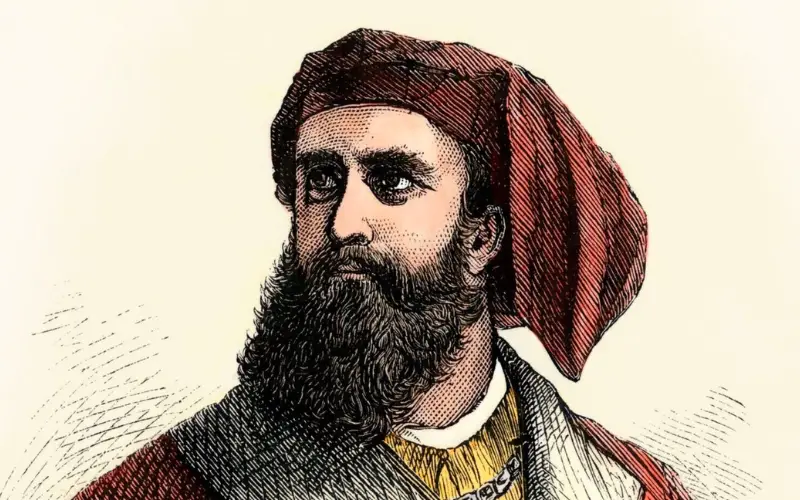
Marco Polo’s accomplishments include:
- Polo was one of the first Europeans to travel to Asia and China, visiting many exotic lands, including Persia, India, and China, and documenting his experiences.
- Polo’s book, The Travels of Marco Polo, is a classic of travel literature providing a valuable firsthand account of Asia and China in the 13th century.
- Polo’s book helped to introduce Europe to the East, and it played a major role in shaping European understanding of Asia and China.
Marco Polo’s legacy is one of exploration, discovery, and cultural exchange. He is credited with helping to introduce Europe to the East and shaping European understanding of Asia and China. His book, The Travels of Marco Polo, is a classic of travel literature and continues to inspire and amaze people around the world.
Conclusion
In the annals of human history, the exploits of these 15 great explorers stand as monuments to the indomitable spirit of adventure and discovery. Their journeys into uncharted territories not only expanded the maps but also broadened our understanding of the world. From the fearless voyages of Columbus and the maritime mastery of James Cook to the intrepid quests of Shackleton and the awe-inspiring lunar landing of Neil Armstrong, these explorers exemplify the human drive to explore the unknown. Their legacies continue to inspire, urging us to push the boundaries of our knowledge and embark on our own voyages of exploration, whether to the far reaches of space, the deepest ocean trenches, or the uncharted territories of science and technology. The spirit of exploration lives on, and it is our privilege and responsibility to honor the legacy of these great adventurers by continuing to seek out the wonders of our world and beyond.
Read More Fun Facts
Learn more fun facts with Trivia Mastermind content.
Play Trivia!
Challenge yourself and play trivia questions with answers and explanations.
Recent Posts
Science Trivia - Astronomy ...
Step into a realm of nostalgia as we embark on a journey through the annals of pop culture and bid farewell to 35 recently obsolete technologies. In the ever-evolving landscape of innovation, certain...
